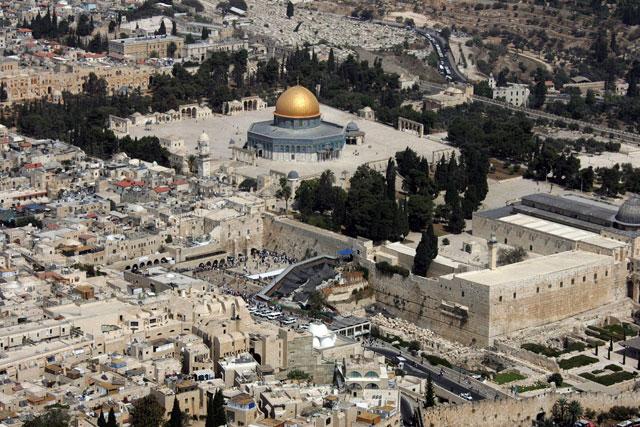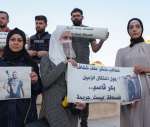You are here
UNESCO fully backs Jordan’s pro-Jerusalem moves
By JT - Oct 14,2016 - Last updated at Oct 14,2016

This photo taken on October 2, 2007 shows an aerial view of the Dome of the Rock in Al Haram Al Sharif in Jerusalem's Old City (AFP photo)
AMMAN — UNESCO on Thursday adopted a decision that calls on Israel to allow the restoration of the historic status quo of Al Aqsa Mosque/Al Haram Al Sharif, condemning escalating Israeli aggressions against the Jerusalem Awqaf Department personnel.
The decision on Jerusalem was taken during UNESCO Executive Board's 200th session meetings, held in Paris, which approved all moves Jordan has taken in the interest of the holy city, especially during the past three years, according to the text of the resolution posted on UNESCO’s website.
The decision, classified under the name “Occupied Palestine”, comes as part of intensified Jordanian diplomatic efforts to defend Jerusalem and its sanctuaries, under the leadership of His Majesty King Abdullah.
Jordan’s efforts are in line with the Hashemite custodianship of those sanctuaries, the Jordan News Agency, Petra, said.
The Foreign Ministry prepared the decision and presented it to the permanent Jordanian delegation at UNESCO, in coordination with the Palestinian delegation, to approve the consideration of “Al Aqsa Mosque” and “Al Haram Al Sharif” as synonyms, in response to Israeli authorities’ attempts to differentiate between the two terms and what they refer to.
The decision reaffirms the “Mughrabi Gate” (Bab Al Magharbeh) as an integral and inseparable part of Al Aqsa Mosque, and calls on Israel, as an occupation force, to allow the restoration of the historic status quo that prevailed until September 2000.
Under the status quo, the Jordanian Awqaf Department exercised exclusive authority over Al Aqsa Mosque/Al Haram Al Sharif, and its mandate extended to all affairs relating to the unimpeded administration of the mosque, including maintenance, restoration and regulating access.
UNESCO “strongly condemns the escalating Israeli aggressions and illegal measures against the Awqaf Department and its personnel, and against the freedom of worship and Muslims’ access to Al Aqsa Mosque/Al Haram Al Sharif, and requests Israel to respect the historic status quo and to immediately stop these measures”.
It also firmly “deplores the continuous storming of Al Aqsa Mosque by Israeli extremists and uniformed forces”, and urges Israel to take the necessary measures to prevent provocative abuse incidents that violate the sanctity of Al Aqsa Mosque/Al Haram Al Sharif.
The decision “deeply decries the continuous Israeli aggressions against civilians, including Islamic religious figures and priests, [and] decries the forceful entering into the different mosques and historic buildings inside Al Aqsa Mosque/Al Haram Al Sharif by different Israeli employees including the so-called ‘Israeli antiquities’ officials”.
Moreover, it criticises the arrests and injuries among Muslim worshippers and Jordanian Awqaf guards in Al Aqsa Mosque/Al Haram Al Sharif by Israeli forces, and urges Israel to end these abuse incidents, which, it says, inflame the tension on the ground and between faiths.
The decision asks UNESCO’s director general to take the necessary measures to allow for the implementation of Jordan’s plan to rebuild Bab Al Magharbeh.
The resolution deplores the Israeli decision to approve a plan to build a two-line cable car system in East Jerusalem and the so-called “Liba House” project in the Old City, as well as the construction of the so-called “Kedem Centre”, a visitor centre near the southern wall of Al Aqsa Mosque, the construction of the Strauss Building and the elevator project in Al Buraq Plaza.
Furthermore, the decision urges Israel to renounce the projects in question and to stop the construction works, in conformity with its obligations under the relevant UNESCO conventions, resolutions and decisions.
Jordan has helped register Jerusalem on UNESCO’s World Heritage List in 1981 and on the World Heritage in Danger List in 1982, Petra reported.
Regarding Gaza, the decision deplores military confrontations in and around the strip and the civilian casualties caused, including the killing and injury of thousands of Palestinians, as well as the continuous negative impact on the fields of competence of UNESCO and the attacks on schools and other educational and cultural facilities, including breaches of inviolability of UNRWA schools.
As for Al Haram Al Ibrahimi in Hebron and the Bilal Ibn Rabah Mosque in Bethlehem, the decision reaffirms the two sites as integral parts of Palestine. It also shares the conviction affirmed by the international community that they are of religious significance to Judaism, Christianity and Islam.
Al Haram Al Ibrahimi is also revered in Judaism and Christianity as the Tomb of the Patriarchs, while the Bilal Ibn Rabah Mosque in Bethlehem is also the site of Rachel’s Tomb, which holds religious significance to Muslims, Jews and Christians.
Related Articles
AMMAN — UNESCO on Tuesday adopted the Jordanian-drafted resolution on Jerusalem, following a "diplomatic showdown” with some member states t
AMMAN — UNESCO’s World Heritage Committee, comprising of representatives from 21 countries, on Wednesday adopted another resolution on Jerus
AMMAN — Jordan on Tuesday reiterated that Al Aqsa Mosque/Al Haram Al Sharif, with its total area of 144 dunums, including its walls and gate
















